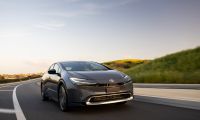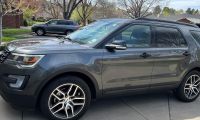Toyota announced its plans for using electrification in all forms to solidify its green vehicle leadership into the next decade. The crux of the plan is that by 2030, "...the number of Toyota models developed without an electrified version will be zero." To be crystal clear for those who may opt out of the story at this moment, this does not mean that Toyota will be moving to battery electric vehicles only. Read on.
Toyota Electrified Vehicle Plan 2025
Toyota plans to have an electrified version of every one of its models by 2025. The term "electrified" as used by Toyota, GM, Volvo, and others, includes hybrid electric vehicles. When automakers make these announcements, we would prefer that hybrids be kept separate from vehicles that can propel themselves with electricity sourced from a power supply other than the on-board engine, but most automakers lump hybrids in with plug-in hybrids, extended-range EVs and battery electrics when speaking about "electrification."
Those looking for the electric vehicle goal, including only battery electrics and fuel-cell EVs will be happy to hear that Toyota expects to have sold one million of those by 2030. To date, its sales are in the low thousands of these two types of vehicles and the fuel cell ones are not working out. Perhaps Toyota's only green car that hasn't gone to plan.
EV Plans - It's Always China - Here's why
Like every automaker that sets EV goals, Toyota is including its EV sales in China as part of its announcement. The reason for that is in China, smaller-than-subcompact, short-range EVs are about to explode. Or continue to explode, or do whatever means a lot of them are about to be on the road. China is a country of cities with residents who have no intent to drive a personal vehicle to another city. Unlike in the U.S., there is no pre-existing personal mobility culture. Toyota, GM, and others will build what we would call "neighborhood electric vehicles" in huge numbers. These are not "real cars" to most Americans, but including them in totals makes for punchy headlines.
Toyota's EV Leadership
Despite the hype over Tesla and its Model 3, Toyota has produced the top-selling electric vehicle in America multiple months of this year and, as of November, was selling the third-leading model, the Prius Prime. Expected to top 20,000 units sold in the U.S. this year, the Prime will outsell the Model 3 by roughly 15 or 20 to one in 2017. If all goes to plan, the Model 3 will then crush all other EVs in sales in 2018. That was supposed to happen this year. We'll see what happens, and report accordingly.
Toyota's Goal - Partly There Now
Toyota already has met much of the goal announced today. With its hybrid electric RAV4 selling at about 4,500 units per month, the Camry, Highlander, Avalon, and Prius hybrids selling steadily, and with so many of its Lexus models already offered as hybrids, including every new model, Toyota is easily the automaker with the widest green car "electrified" offering in the U.S. market. And the most successful.
Set Torque News as Preferred Source on Google












Comments
Listen John,
Permalink
Listen John,
The Prius Prime is not an electric vehicle. It is a short electric range plug-in hybrid that gets most of its forward momentum from gasoline.
No, Toyota doesn't usually meet their "green car goals." That is why they are reversing coarse as we speak on hydrogen fuel cell vehicles and launching goals on electric vehicles. Toyota is living off the glory of 2nd and 3rd Generation Prius it is no longer contributing to that reputation.
Cool name. I understand your
Permalink
In reply to Listen John, by Robb Stark (not verified)
Cool name. I understand your view that the Prime is not an electric vehicle, and frankly, I'm cool with calling it whatever you like. Inside EVs, and other EV advocacy publications list it along with all the other types of EVs in their sales tallies, so I will continue to follow that lead. Subtract out the range assisted EVs and there is not much to talk about. I hope you are right about Toyota bailing on hydrogen. It makes no sense on so many levels. I can't agree with your take on the Prius hybrid though. It outsold all the battery electrics combined last month (again) in the U.S. and it wasn't even a particularly good month for Prius. We may be jaded to Prius' success, but it keeps on proving every month that to many green car shoppers, it is the most attractive and sensible green car in the world.